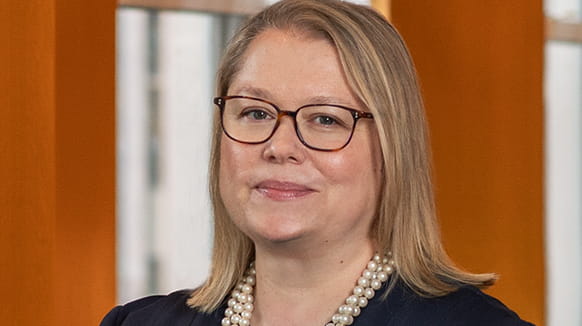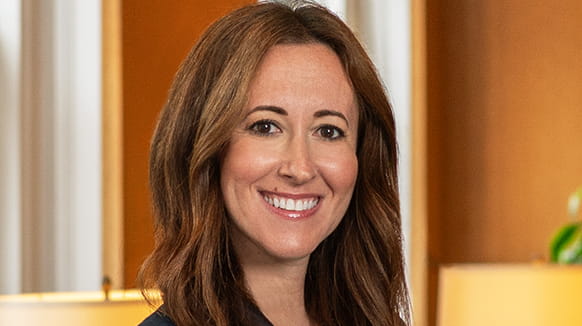Meet Ingrid Bagby and Michele Maman, Haynes Boone Partners based in the New York office who joined the firm in July. Bagby and Maman are two well-established restructuring attorneys with decades of collective experience working together to represent sophisticated financial institutions, private lenders and other market participants in complex and high-value distressed situations. They bring an integrated practice with a focus on creditor-side restructurings and special situations across a variety of industries. In this Q&A spotlight, Ingrid and Michele share their insights on the current economic climate, trends in New York’s restructuring market and the distinctive nature of their practice.
1) Can you describe the nature of your practice?
We are bankruptcy, crisis management and work-out specialists with transactional and litigation experience counseling creditors, lenders, investors, ad hoc groups and other market participants involved in financially distressed and crisis situations. Our practice takes a holistic approach to help our clients develop a legal strategy that is commercial while best achieving their business goals and objectives, whether the scenario is in-court or out-of-court. We are industry agnostic and work on a wide range of restructurings and reorganizations – from classic Chapter 11 bankruptcies to very bespoke out-of-court workouts effectuated solely through private agreements.
In addition to having experience representing all types of constituents in a Chapter 11 bankruptcy case, we also have experience at the intersection of structured finance and bankruptcy. This includes representing the largest secured creditor in the Zohar CLOs restructuring in Delaware Bankruptcy Court, and representing a large CLO manager in connection with numerous restructurings. We have also been involved in a wide range of restructurings, such as the wind-down of financial firms (e.g. hedge funds) in bespoke out-of-court processes, the representation of a joint venture in the acquisition of assets with significant government contracts, the representation of an agent bank in a cross-border commodities restructuring and the representation of an ad hoc committee of secured lenders in a shipping restructuring. The range of our practice expands to real estate issues, which includes representing the liquidators of the Lehman Bermuda subsidiary in their workout and disposition of a diverse portfolio of several hundred million dollars in commercial real estate loans in the U.S. and abroad, the senior secured lender in connection with the default, exercise of remedies and intercreditor-related issues in the Chapter 11 case of a Manhattan hotel that filed for bankruptcy in order to block a foreclosure on the property by the mezzanine lender, and a repo counterparty in connection with the bankruptcy of a reverse mortgage lender.
2) What drew you to Haynes Boone?
Haynes Boone combines a wide array of practice areas that are critical to handling a restructuring. The firm has depth and strength in litigation, all flavors of finance, corporate/M&A and insurance – among numerous other areas. That full suite of capabilities is key, as you need to have every tool in the toolbox available to best guide a client through a complex, distressed situation. Additionally, Haynes Boone has a strong culture of collaboration and “expertise without ego” within the partnership and we felt this was the best platform for the future of our practice. It is rare to find a firm that feels both entrepreneurial and fully integrated, but that’s exactly what we have found at Haynes Boone. We appreciate the unique momentum here at Haynes Boone and we are excited to be part of the growing and forward-thinking New York office.
3) With mixed signals around the economy right now, what are you paying attention to when it comes to real estate and restructuring?
In addition to watching for changes to interest rates and the impact thereof on distressed debt and workouts, there is a substantial amount of commercial real estate debt maturing in the next year or so. Not every situation can be addressed by an “extend and pretend” tactic or by layering on new financing, especially at current rates, so it will be interesting to see how creative alternative credit providers and sponsors will be to address these upcoming loan maturities. In addition, we are paying attention to certain office towers and other commercial real estate where the debt is so underwater that it is triggering losses on related CMBS bonds. The impact of the high CMBS office delinquency rate on investors is something to watch closely. It will be interesting to see the knock-on effects from these distressed situations where sponsors are turning their properties over to the lenders.
4) How does the New York market differ from other regions?
As the global capital of financial services, New York is a highly competitive market in every way. That compels us, as professionals, to constantly raise our game and that is why it has been so exciting to be part of the growing Haynes Boone New York office – where the office and our colleagues match the energy and intensity of the city. Because restructuring matters are often multi-disciplinary, it is important to be part of a firm with all the necessary complimentary areas of expertise to effectively discharge advice on a complex workout, allowing us to be a leader in restructuring within the New York market. To that end, we are thrilled to have joined a team that shares our commitment to delivering strategic results for clients through cross-department collaboration. Underscoring the firm’s ongoing focus on building depth in core practices, Haynes Boone has welcomed a dozen lateral partners in New York alone in the last year (and approximately 20 firmwide), strengthening the firm’s capabilities in derivatives/CLO, private credit, capital markets, white collar enforcement, M&A, energy, intellectual property and litigation, among others. These are all areas of importance to us and complimentary to our restructuring practice.

